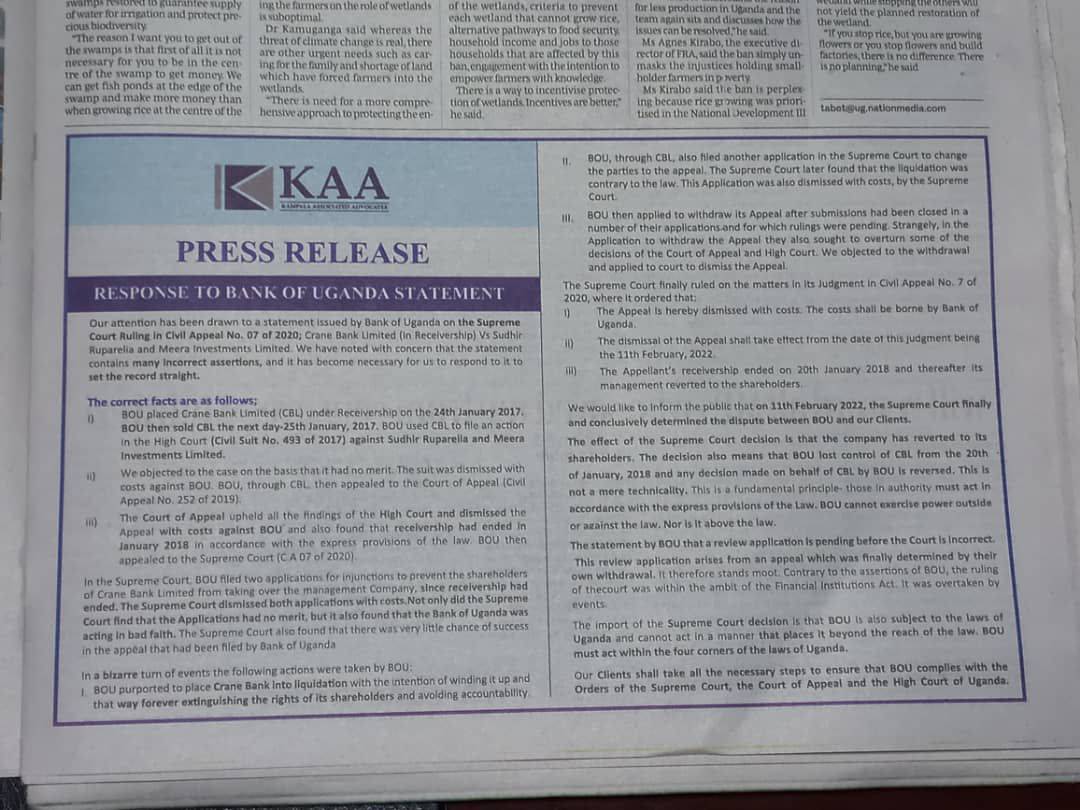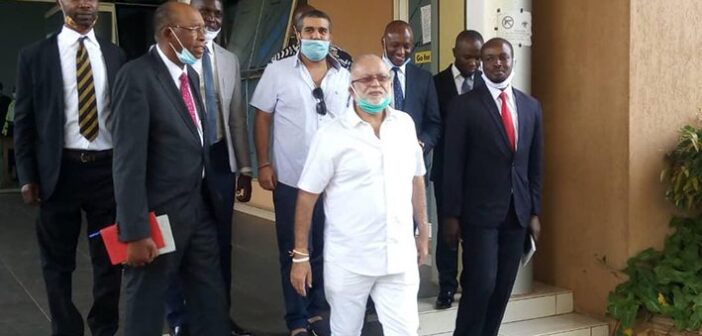Pressure and panic from Bank of Uganda (BoU) officials continue to leak to the public over the recent Supreme Court ruling in which the Bank was ordered to ‘vomit’ mogul Sudhir Ruparelia’s Crane Bank but also cough to him billions of all the charges he has incurred in the last five years of endless legal battles.
For our first time readers, this month, Supreme Court ruled that:
- That the Judgments of the lower courts, stood. The lower courts found that the receivership of Crane Bank Ltd. ended on January 20, 2018, it was a closed financial institution and was non-existent.
- That upon withdrawal of the appeal by Crane Bank Ltd (In Receivership) and objection by Sudhir Ruparelia and Meera Investments Ltd on September 20, 2021, the Appeal stood dismissed and the only issue to be determined was on costs and who should pay. However, the dismissal would take effect on the date of endorsement of the ruling (February 11, 2022).
- That Bank of Uganda should pay the costs of the suit because it was aware at the time of taking over that Crane Bank Ltd was financially distressed, incapacitated and could not be expected to pay costs. That it is not logical to expect a shareholder of Crane Bank Ltd. (ln Receivership) who is entitled to costs of an action to pay costs to himself.

KAA’s Press release reads in part
“The 1st respondent was closed as a financial institution and placed under receivership. Upon closer, it ceased being a financial institution under the Act and it could therefore, not be progressed to liquidation. The 2nd respondent’s act therefore of moving the 1st respondent to liquidation are contrary to the above clear provisions of the law and the same cannot be sanctioned by this court,” states part of the ruling.
You many actually remember that in all legal battles, Courts of law have been ordering Bank of Uganda to pay costs to Sudhir who has floored them multiple times.Hint On Previous Rulings
In previous court rulings, BoU said that the decision of shutting Crane Bank was necessary upon discovering that it had significant and increasing liquidity problems that could not be resolved without the Central Bank’s intervention, given that Crane Bank had failed to obtain credit from anywhere else.
“An inventory by external auditors found that the assets of Crane Bank were significantly less than its liabilities. In order to protect the financial system and prevent loss to the depositors of Crane Bank, Bank of Uganda had to spend public funds to pay Crane Bank’s depositors,” BoU governor, late Tumusime Mutebile said then.
However, tycoon Sudhir denied the allegation thus counter-suing BoU, seeking compensation of $8m (Shs28 billion) in damages for breach of contract.
He asked the High Court to dismiss the case arguing that the Central Bank overstepped its mandate in commencing court proceedings against him and his Meera Investments Company.
Presenting an objection against BoU, Sudhir through his lawyers Kampala Associated Advocates, told Justice Wangutusi that when dissolving a bank, BoU had three options including putting someone else in its management – what is termed as statutory management, receivership or liquidation.
Counsel Elison Karuhanga a lawyer at Kampala Associated Advocates, argued that however, BoU chose to go for receivership yet under the law, specifically only the manager and the liquidator of the said bank is mandated to file a suit and not a Receiver.
He further explained that BoU as a Receiver could only dissolve or sell Crane Bank within 12 months but not sue its managers.
To you our first time reader, all these stem from June 30, 2017, when Crane Bank Limited (in Receivership) took Mr. Sudhir Ruparelia and his Meera Investments Ltd. to court for causing financial loss amounting to UGX 397 billion to Crane Bank in fraudulent transactions and land title transfers.
Crane Bank (in receivership) in its Civil Suit No. 493 of 2017 sought High Court to compel Mr. Ruparelia to pay back the US$80,000,000, US$9,270,172.00, US $ 3,560,000.00, US$990,000.00 and UGX 52,083,995.00 as compensation for breach of fiduciary duty.
While Justice Wangutusi dismissed the UGX397 billion case against Mr. Ruperalia on a technicality, alleging that Crane Bank (in Receivership) lost its powers to “sue” and to “be sued”, thus rendering its suit a nullity, Crane Bank (in Receivership) maintaining that receivership is a management situation, and hence no legal change as to the capacity of a company to sue and be sued which ruling BoU disagreed with and instead kept on appealing till the last court losing at all levels to the tycoon.
Crane Bank started operations on 21 August 1995 “with a vision of being the largest privately owned Ugandan Bank.”
In September 2012, Crane Bank acquired the assets and some of the liabilities of the National Bank of Commerce, a small, indigenous, financial services provider in Uganda that had lost its banking license.
On 30 January 2014, Crane Bank established Crane Bank Rwanda Limited, a wholly owned subsidiary, with the first branch in Rwanda opening to customers on 30 June 2014.
Later, the Bank was closed by the Bank of Uganda on October 20, 2016, saying that it had failed to comply with a capital call on July 1, 2016. Back then, Central Bank Governor Emmanuel Tumusiime Mutebile said that the Bank takeover was guided by the systemic nature of the under-capitalized institution to avoid financial sector instability.
The bank was a large financial services provider in Uganda. As of 31 December 2015, Crane Bank’s assets were UGX:1.81 trillion, with shareholders’ equity of UGX:281.43 billion. In October 2015, it had more than 750,000 customers.



